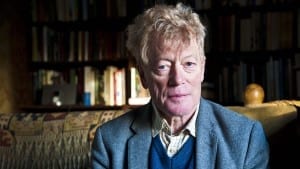
Photo Credit: Roger Scruton © Francesco Guidicini/The Sunday Times
Sir Roger Scruton, the British philosopher and writer, has died at age 75. We will not see his like again. But see him we did, here at Belmont Abbey. At the 2004 Weaver/Ingersoll Forum, under the auspices of the Bradley Center for the Study of Christian Culture at Belmont Abbey College, Scruton received the Richard M. Weaver Prize for Scholarly Letters.
Scruton’s Weaver Prize acceptance speech later formed the basis of a book, Culture Counts. The book makes a case for Western culture: a dynamic, creative force in the world, capable of containing even highly conflicting judgments about value, yet with a character, mindset, and body of artifacts that set it apart from anything else. Scruton was concerned that destructive “post-modern” forms of thought, largely inspired by Marxism, are taking aim at their host civilization to create a largely undefined, confused, and relativistic culture. He terms the post-moderns’ thoughts and activities a “Culture of Repudiation.” For destructive intellectual elites, life is characterized by a repudiation of all that they have received via Western culture, and excitement at tearing down what has taken others millennia to build.
Scruton’s expansive body of writing continually highlights the incipient snobbery and hypocrisy of the new intellectual elites, many of whom have achieved their ascendency by criticizing “high culture” and the great achievement of higher education in the West. Yet, far from manifesting a concern for the average or “little” people of society, the “Culture of Repudiation” resembles a sort of Gnosticism: a special knowledge for select insiders. Michel Foucault especially falls under Scruton’s penetrating gaze. Indeed, French radicalism, both academic and popular (e.g., cars burning in Paris streets in 1968), was a shock and personal turning point for the young Roger Scruton, as he explains in a famous essay, “Why I Became a Conservative.”
Roger Scruton’s legacy is not confined to his writing, however. Scruton’s role in the intellectual dismantling of Eastern European totalitarianism, especially as represented by his great friendships and cooperation with figures such as Vaclav Havel, ranks as one of the greatest achievements in the twentieth century by any man of letters. Scruton, John Paul II, Ronald Reagan, and Margaret Thatcher, in their varied ways, undermined Marxist totalitarian dreams and represented the triumph of the spiritual over the material and deterministic.
At the same Weaver/Ingersoll Symposium in 2004, where Scruton received his award from Belmont Abbey, he late Fr. James Schall, S.J., was also among the speakers. It was fortunate for all in attendance that these two great men could blend their voices and ideas, arguably making the 2004 Weaver/Ingersoll forum one of the greatest events ever held on campus.
Students in my Theology of Culture class must watch Scruton’s brilliant documentary “Why Beauty Matters.” I highly recommend it to everyone interested in the theme or in learning about Scruton. There is a tension in this presentation between Scruton the philosopher and the theological faith of Christians, but the tension is a fruitful one. Scruton’s own faith, which grew over the years, led with the category of beauty; and it is assuredly the case that he has now finally gained the fullness of what he sought through beauty and such a life of peerless integrity. Requiescat in pace.
Dr. Ronald Thomas
Associate Professor of Theology


